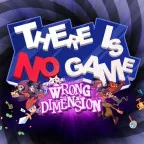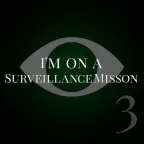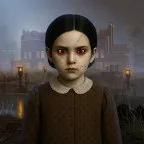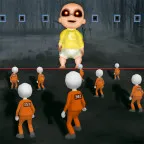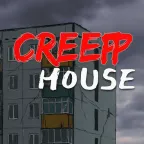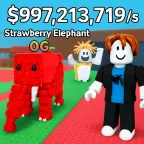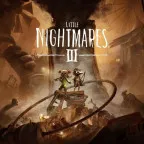We Become What We Behold
About We Become What We Behold
We Become What We Behold is a short point-and-click game that is packed with social and media metaphors. In just five minutes of gameplay, each click you make can create a chain reaction, changing the square and round community and showing how news and social media can easily magnify small things into a spiral of crisis.
How to Play We Become What We Behold
The game takes place in a simple setting, where “peeps” – people with square or round heads – walk around randomly. Your only task: take a picture of them with the left mouse button.
- The picture you take will appear right in the middle of the screen and be broadcast on a TV.
- The entire community of characters will look at that TV and start… changing their behavior based on what you choose to photograph.
- Each choice has a social impact: spreading, multiplying, or creating conflict.
The interesting thing here is that you do not control any of the characters. You only choose “what will be seen” – but it is this selection that determines the entire story of the game.
Miniature Society - From Hot to Riot
The game takes you through a series of events that truly reflect the operation of the media:
Fancy Man With The Hat: When a character wearing a hat appears, your instinct is to take a picture because he is different. Immediately, the hat becomes a trend. Everyone rushes to wear hats. But when you take a picture of a normal “people” wearing a hat, it suddenly becomes boring and out of fashion. A deep satire on the spiral of trends.
Couple In Love: A sweet moment, should be cherished. But when you put it on air, what happens? They are ridiculed, shunned. The message is clear: "Who wants to watch people living together in harmony?" – The harsh truth about how the media often ignores the positive, the good.
Angry Person: This is the tipping point. You are urged to “take a picture of them doing something”. And the only thing they do is scream. Once the angry photo is spread, the media machine officially starts up. Fear and anger spread at a dizzying speed, much faster than love. Square and round people begin to doubt, alienate, attack each other. The red color of hatred covers the screen.
You, by your own “reporting” choices, have unintentionally (or intentionally?) started a miniature racism crisis, where the square-round shape difference becomes a trigger for violence.
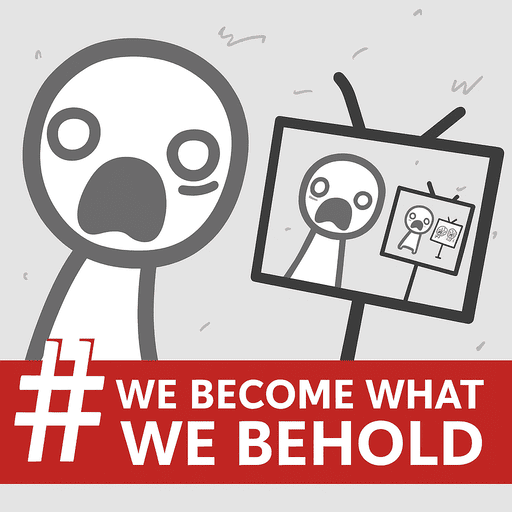
The Painful Message Behind Simple Pixels
We Become What We Behold's images are really simple, however this emphasizes the point it wishes to make:
- We become what we see: Your perspective will be skewed and clouded if all you see on the news is violence, hatred, and division.
- Media shapes perception: The game clearly shows the power of "framing" information. The same event, the angle you choose to report will determine how the public reacts.
Toxic cycle: This is a "vicious cycle" - a toxic vicious cycle. The media reports sensational news to attract views, the public consumes and reinforces that need, causing the media to produce more sensational news. And so, we all fall into the abyss.
Little-Known Facts About We Become What We Behold
- The game took just 5 weeks to complete
Nicky Case once shared that the entire game was developed in just over a month, as a “quick experiment” on the idea of media and society.
- Inspired by philosopher Marshall McLuhan
The opening quote “We shape our tools, and then our tools shape us” is from Marshall McLuhan – a famous media philosopher who deeply analyzed the impact of media tools on society.
- No “happy ending”
No matter what the player captures, the game always leads to a violent climax. Nicky Case intentionally designed it this way to emphasize the cyclical nature and inevitability of negative news.
- Only one update (2018)
The 2018 update made sure the game works more smoothly on modern browsers by fixing a few small bugs without altering the gameplay.
- Nicky Case makes the game completely free
The author allows anyone to play the game online, does not block content, and encourages support via Patreon. This is also a familiar style of Case in many previous projects.
- Used in the classroom and research
Many teachers and media researchers have used the game as a visual example to explain the “contagion effect” of news and social media.
Conclusion
We Become What We Behold is a demonstration of how a short game can encapsulate a big idea. Released in October 2016 and updated in October 2018, Nicky Case – the creator of Parable of the Polygons and Coming Out Simulator 2014 – uses only a camera and square faces to create a society that reflects the player’s own choices.
Simulation Games

























